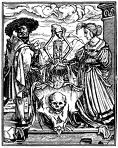[This is taken from Augustine Calmet's Phantom World, originally published in 1850, revised and edited by D. J. McAdam, 2010. Copyright as such.]

The ancient heathens, both Greeks and Romans, attributed to magic and to the demon the power of occasioning the destruction of any person by a manner of devoting them to death, which consisted in forming a waxen image as much as possible like the person whose life they wished to take. They devoted him or her to death by their magical secrets: then they burned the waxen statue, and as that by degrees was consumed, so the doomed person became languid and at last died. Theocritus makes a woman transported with love speak thus: she invokes the image of the shepherd, and prays that the heart of Daphnis, her beloved, may melt like the image of wax which represents him.
Virgil also speaks of these diabolical operations, and these waxen images, devoted by magic art.
There is reason to believe that these poets only repeat these things to show the absurdity of the pretended secrets of magic, and the vain and impotent ceremonies of sorcerers.
But it cannot be denied that, idle as all these practices may be, they have been used in ancient times; that many have put faith in them, and foolishly dreaded those attempts.
Lucian relates the effects of the magic of a certain Hyperborean, who, having formed a Cupid with clay, infused life into it, and sent it to fetch a girl named Chryseïs, with whom a young man had fallen in love. The little Cupid brought her, and on the morrow, at dawn of day, the moon, which the magician had brought down from the sky, returned thither. Hecate, whom he had evoked from the bottom of hell, fled away, and all the rest of the scene disappeared. Lucian, with great reason, ridicules all this, and observes that these magicians, who boast of having so much power, ordinarily exercise it only upon contemptible people, and are such themselves.
The oldest instances of this dooming are those which are set down in Scripture, in the Old Testament. God commands Moses to devote to anathema the Canaanites of the kingdom of Arad. He devotes also to anathema all the nations of the land of Canaan. Balac, King of Moab, sends to the diviner Balaam to engage him to curse and devote the people of Israel. "Come," says he to him, by his messenger, "and curse me Israel; for I know that those whom you have cursed and doomed to destruction shall be cursed, and he whom you have blessed shall be crowned with blessings."
We have in history instances of these devotings and maledictions, and evocations of the tutelary gods of cities by magic art. The ancients kept very secret the proper names of towns, for fear that if they came to the knowledge of the enemy, they might make use of them in their invocations, which to their mind had no might unless the proper name of the town was expressed. The usual names of Rome, Tyre, and Carthage, were not their true and secret names. Rome, for instance, was called Valentia, a name known to very few persons, and Valerius Soranus was severely punished for having revealed it.
Macrobius has preserved for us the formula of a solemn devoting or dooming of a city, and of imprecations against her, by devoting her to some hurtful and dangerous demon. We find in the heathen poets a great number of these invocations and magical doomings, to inspire a dangerous passion, or to occasion maladies. It is surprising that these superstitious and abominable practices should have gained entrance among Christians, and have been dreaded by persons who ought to have known their vanity and impotency.
Tacitus relates that at the death of Germanicus, who was said to have been poisoned by Piso and Plautina, there were found in the ground and in the walls bones of human bodies, doomings, and charms, or magic verses, with the name of Germanicus engraved upon thin plates of lead steeped in corrupted blood, half-burnt ashes, and other charms, by virtue of which it was believed that spirits could be evoked.
Disclosure: We are independently owned and the opinions expressed here are our own. We do have advertisements with links to other sites on our pages, and may receive compensation when you click on one of those links and/or purchase something from one of those sites.
Copyright © D. J. McAdam· All Rights Reserved